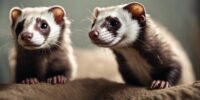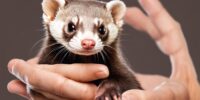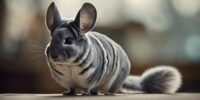What Are the Dangers of Feeding Ferrets Cat Food?
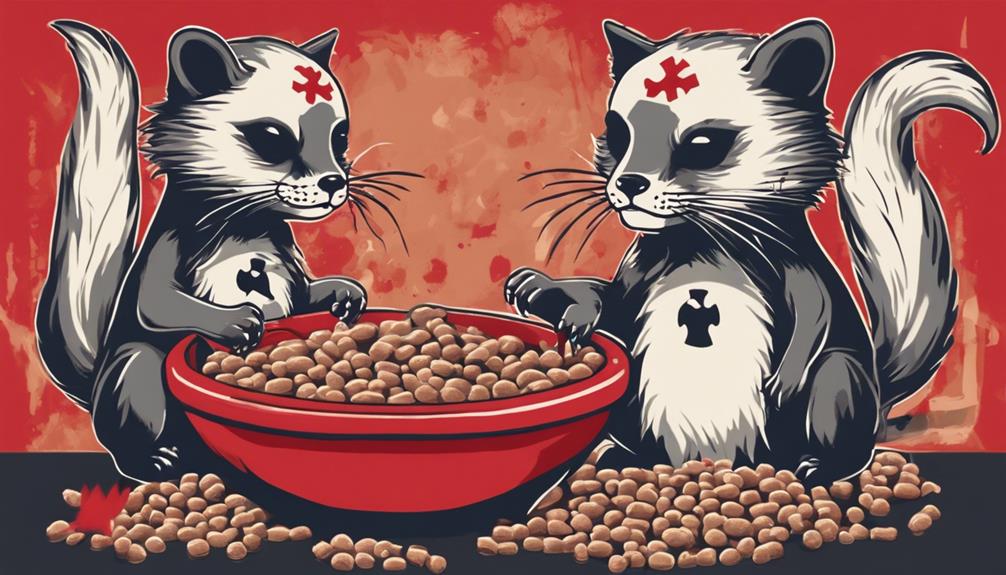
Feeding ferrets cat food can lead to nutritional imbalances and potential urinary tract issues, posing risks to their health.
Ferret owners should avoid this practice to ensure their pets' well-being and make informed dietary choices.
Nutritional Imbalance
Feeding ferrets cat food can lead to a significant nutritional imbalance, potentially causing severe health issues in these small carnivores. One critical aspect affected by feeding ferrets cat food is the protein source. Cat food is formulated for the dietary requirements of cats, which differ from those of ferrets. Ferrets are obligate carnivores and need high levels of animal-based protein, while cat food may not provide a sufficient amount of protein suitable for ferrets, leading to deficiencies and health problems.
Another crucial factor impacted by feeding ferrets cat food is the calcium level. Ferrets require a diet with moderate levels of calcium to support their bone health and overall well-being. Cat food often contains different levels of calcium, which may not align with the specific needs of ferrets. Excess or insufficient calcium intake can result in skeletal issues and other health complications in ferrets.
Digestive Issues
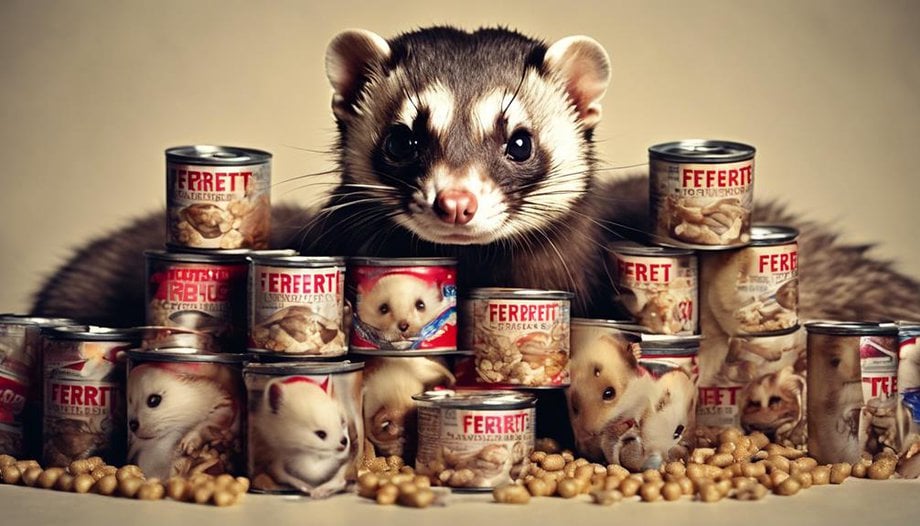
Digestive problems can arise when ferrets are given cat food due to the mismatch in nutritional requirements. Ferrets have specific dietary needs that differ from cats. Cat food is higher in plant-based proteins and grains, while ferrets require a diet high in animal proteins and fats. This disparity can lead to digestive issues such as diarrhea, vomiting, and gastrointestinal discomfort in ferrets.
Additionally, ferrets are known to have food sensitivities, especially to certain ingredients commonly found in cat food formulations. Ingredients like grains, fillers, and artificial additives can trigger allergic reactions and digestive disturbances in ferrets. These sensitivities can manifest as skin problems, digestive upset, and even behavioral changes.
To prevent digestive issues in ferrets, it's crucial to feed them a balanced diet formulated specifically for ferrets. Ensuring that their diet is rich in high-quality animal proteins and fats while avoiding ingredients that ferrets may be sensitive to can help maintain their digestive health and overall well-being.
Obesity Risk
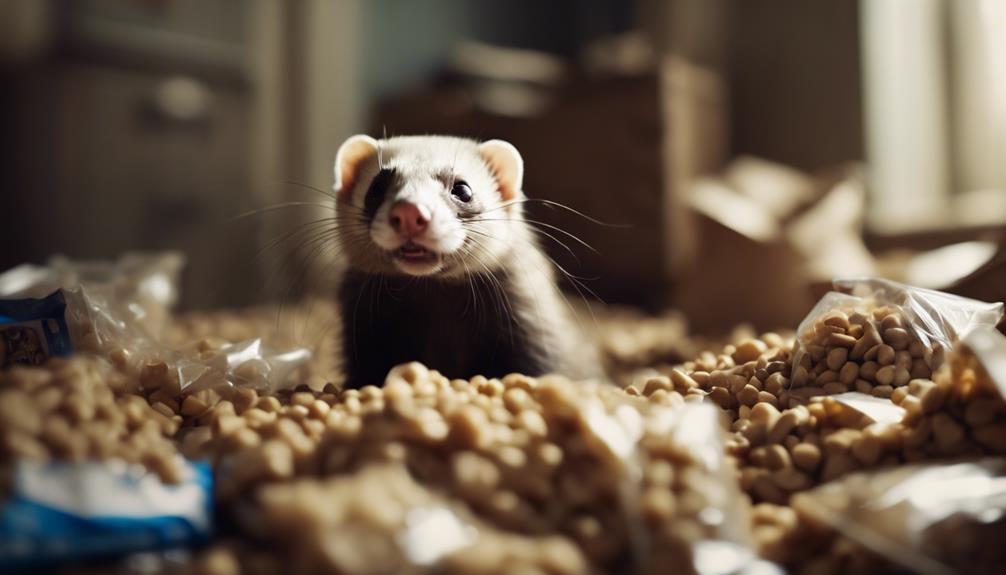
Feeding ferrets cat food poses serious risks of obesity due to the high fat and calorie content in most cat food brands. This excess weight gain can lead to various health problems, including heart issues and joint strain.
Additionally, cat food may not provide the necessary nutrients for ferrets, potentially leading to nutritional deficiencies.
Weight Gain Concerns
With a propensity for weight gain, ferrets consuming cat food face an increased risk of obesity. Ferrets have high metabolisms and require diets rich in protein and fat, similar to their natural prey in the wild.
Cat food, however, is formulated for the dietary needs of felines, which differ significantly from those of ferrets. When fed cat food regularly, ferrets may consume excess carbohydrates and calories, leading to weight gain if not managed carefully.
Controlling portion sizes and providing adequate exercise routines are crucial in preventing obesity in ferrets. Without proper portion control and regular physical activity, the sedentary lifestyle resulting from overeating cat food can significantly impact the overall health and well-being of ferrets.
Nutritional Deficiencies
Nutritional deficiencies in ferrets fed cat food can increase the risk of obesity due to inadequate protein and fat content essential for their high metabolic needs. Ferrets have specific dietary requirements that must be met to maintain optimal health and prevent potential health consequences. When these requirements aren't fulfilled, it can lead to various issues, including obesity. Here are some key points to consider:
- Cat food lacks the necessary taurine levels crucial for ferret health.
- Insufficient protein intake can result in muscle wasting and weight gain.
- Low-fat content in cat food can lead to energy imbalance and obesity.
- Inadequate vitamin and mineral levels may cause deficiencies affecting overall health.
Digestive Issues Potential
Digestive issues potential in ferrets consuming cat food may increase the risk of obesity due to improper nutrient absorption and digestive strain. Ferrets have specific dietary requirements that differ from cats, including higher protein and fat needs.
Cat food lacks the proper nutrition profile essential for a ferret's health, leading to potential digestive disturbances. When ferrets consume cat food long-term, they may struggle to absorb essential nutrients adequately, potentially resulting in weight gain and obesity.
Obesity in ferrets can lead to various health issues, impacting their overall well-being. To ensure the proper functioning of a ferret's digestive system and prevent obesity, it's crucial to provide them with a diet tailored to their specific nutritional needs rather than relying on cat food.
Urinary Tract Problems
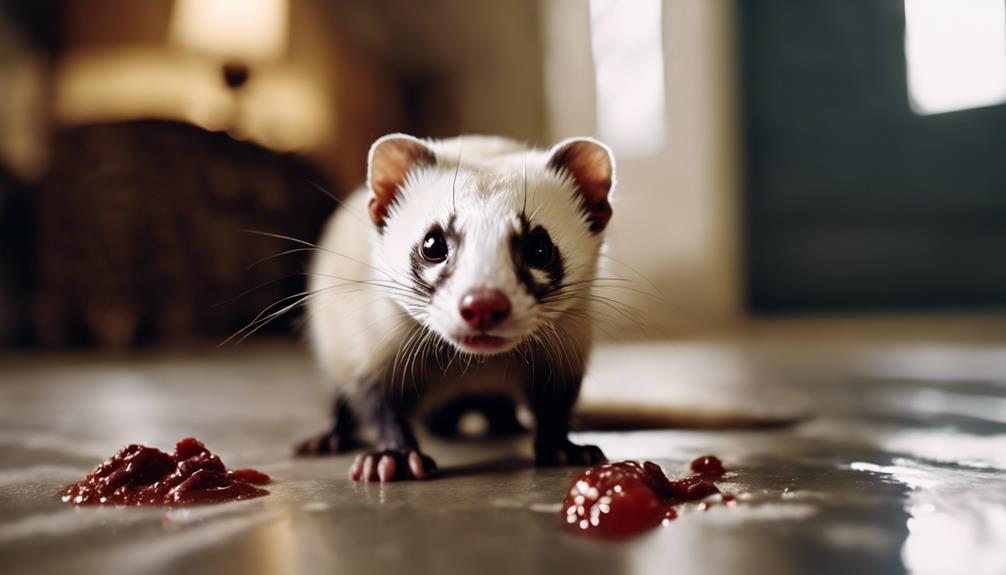
Urinary tract problems in ferrets can significantly impact their health and wellbeing. These issues can arise when ferrets are fed cat food, as it lacks essential nutrients tailored to a ferret's dietary needs. Here are some key points to consider regarding urinary tract problems in ferrets:
- Dehydration: Cat food may not provide sufficient moisture content, leading to dehydration in ferrets, which can contribute to urinary tract complications.
- Urinary Stones: The improper balance of minerals in cat food can increase the risk of urinary stones forming in ferrets, causing pain and potential blockages.
- Prevention Methods: Providing fresh water at all times and feeding a balanced diet specifically formulated for ferrets can help prevent urinary tract problems.
- Treatment Options: If a ferret is experiencing urinary issues, consulting a veterinarian is crucial. Treatment options may include dietary changes, medication, or surgery to address the condition promptly.
Understanding the risks associated with feeding ferrets cat food and taking preventive measures can help maintain their urinary tract health and overall wellbeing.
Lack of Taurine
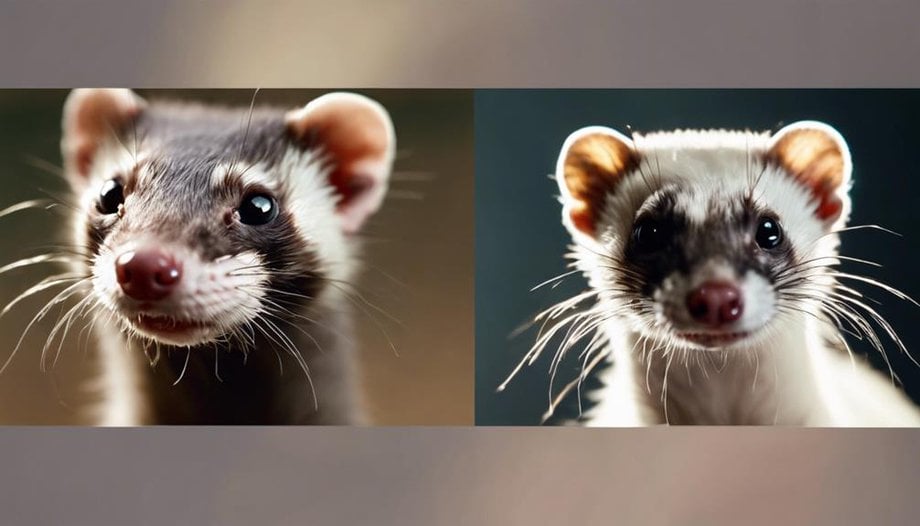
A lack of taurine in a ferret's diet can lead to serious health risks.
Taurine is essential for their heart function, eye health, and overall well-being.
Without adequate taurine intake, ferrets are at risk of developing various health issues that can significantly impact their quality of life.
Taurine Deficiency Risks
Suffering from taurine deficiency due to a diet lacking in this essential nutrient can pose serious health risks to ferrets. Taurine is crucial for various bodily functions in ferrets, and when they don't get enough of it, they may experience severe consequences.
Here are some risks associated with taurine deficiency in ferrets:
- Cardiac Issues: Taurine deficiency can lead to heart problems in ferrets, affecting their overall cardiovascular health.
- Vision Problems: Lack of taurine can result in vision deterioration and other eye-related issues.
- Reproductive Concerns: Taurine plays a role in ferret reproductive health, and deficiency can impact fertility and breeding capabilities.
- Weak Immune System: Ferrets with taurine deficiency may have a weakened immune system, making them more susceptible to infections and illnesses.
Impact on Ferret Health
The absence of sufficient taurine in a ferret's diet can have detrimental effects on their overall health and well-being. Taurine is an essential amino acid that ferrets cannot produce on their own and must be obtained through their diet. Cat food, which lacks the necessary taurine levels for ferrets, can lead to severe health issues due to taurine deficiency. Ferrets have specific nutritional requirements that differ from cats, and meeting these dietary needs is crucial for their optimal health. Below is a table highlighting the impact of taurine deficiency on ferret health:
| Effects of Taurine Deficiency | Consequences |
|---|---|
| Heart Issues | Cardiomyopathy |
| Vision Problems | Blindness |
| Digestive Disorders | Gastrointestinal disturbances |
| Weakness and Fatigue | Lack of energy |
| Poor Coat Health | Dull fur |
Dental Health Concerns
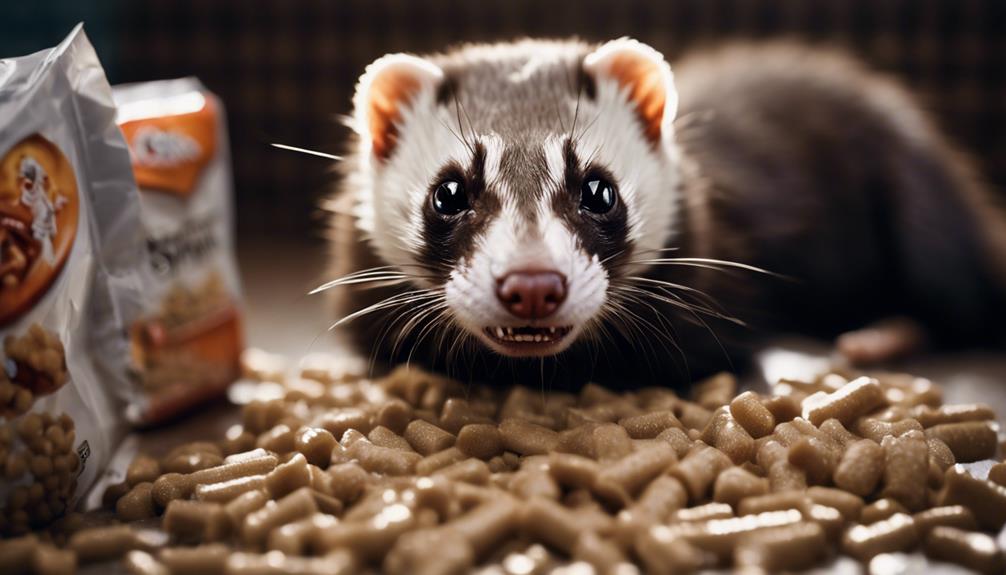
Feeding ferrets cat food can lead to significant dental health issues. Ferrets have specific dietary needs, and cat food doesn't provide the necessary dental care ferrets require. Here are some dental health concerns associated with feeding ferrets cat food:
- Dental plaque: Cat food lacks the abrasive texture needed to remove plaque from ferrets' teeth.
- Gum disease: Inadequate dental care can lead to gum inflammation and disease in ferrets.
- Tooth loss: Without proper chewing behavior stimulation, ferrets may experience tooth decay and even tooth loss.
- Oral infections: The lack of dental cleaning properties in cat food can result in oral infections for ferrets.
Proper nutrition is essential for maintaining a ferret's overall health, including their dental well-being. Providing a balanced diet specifically formulated for ferrets, along with regular veterinary check-ups, can help prevent these dental issues.
Skin and Coat Problems
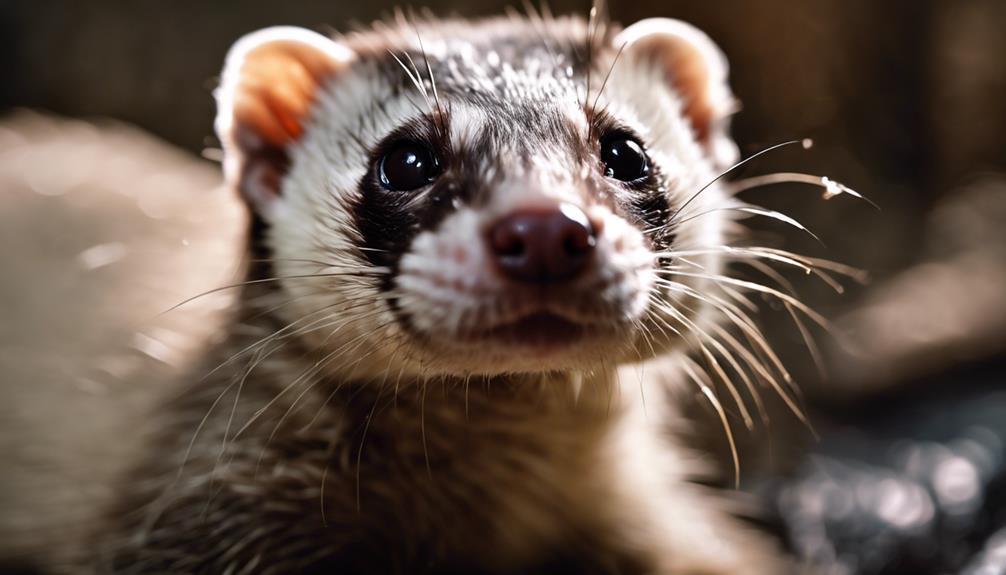
Skin and coat problems in ferrets can arise from inadequate nutrition and improper care. Dry skin is a common issue seen in ferrets fed cat food due to the lack of essential fatty acids in their diet. These fatty acids are crucial for maintaining healthy skin and a shiny coat. Without them, ferrets may experience flaky skin, itchiness, and dull fur.
Additionally, shedding issues can occur when ferrets don't receive the necessary nutrients from their food. Inadequate nutrition can lead to excessive shedding, which may result in patchy fur and overall poor coat quality. To prevent skin and coat problems in ferrets, it's essential to provide them with a balanced diet specifically formulated for their nutritional needs.
Ensuring proper hydration and offering occasional supplements like omega-3 fatty acids can also help maintain their skin and coat health. Ferret owners should consult with a veterinarian to address any skin and coat concerns and establish a suitable diet plan for their pets.
Frequently Asked Questions
Can Ferrets Eat Any Type of Cat Food, or Are There Specific Brands or Types to Avoid?
When considering cat food for ferrets, it's crucial to meet their specific nutritional requirements. Brands like Wysong and Marshall are recommended due to their balanced ingredient analysis. Avoiding cat food with excessive carbohydrates can help prevent potential health risks.
How Often Should Ferrets Be Fed Cat Food, and in What Quantities?
When considering ferrets' nutritional requirements, feeding frequency and portion sizes are crucial. It's recommended to feed them high-quality ferret food to meet their specific needs. Consult a veterinarian for tailored advice on feeding schedules and quantities.
Are There Any Alternative Diets or Supplements That Can Help Prevent the Dangers Associated With Feeding Ferrets Cat Food?
Exploring supplement options and dietary alternatives for ferrets can help mitigate risks linked to cat food consumption. By diversifying their nutrition, owners can safeguard their pet's health and well-being, ensuring a balanced diet tailored for ferrets.
What Are the Potential Long-Term Effects of Feeding Ferrets Cat Food, Beyond the Immediate Health Concerns Mentioned in the Article?
Potential consequences of feeding ferrets cat food include nutritional deficiencies and digestive issues. Dietary alternatives like high-quality ferret food can help prevent long-term health issues. It's essential to provide a balanced diet for optimal ferret health.
Are There Any Specific Symptoms or Signs That Indicate a Ferret May Be Experiencing Issues Related to Their Diet, Such as Consuming Cat Food?
Dietary changes in ferrets, like eating cat food, may lead to behavior changes. Health issues and nutritional deficiencies could manifest through symptoms such as lethargy, hair loss, and digestive problems, indicating potential diet-related concerns.



